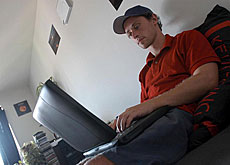
When surfers get caught in the net

An estimated 50,000 Swiss are reported to be addicted to the internet and the trend is particularly high among younger people.
Zurich has become the first canton to launch a campaign to combat the growing trend that very often results in web users losing their grip on reality.
People are increasingly chatting, playing games, visiting sex sites, downloading music and buying items online. The fact that this can be done from the comfort of home, makes it easier for people to get lost in this virtual world, say experts.
Latest figures show that approximately three per cent of surfers – 50,000 people – in Switzerland are addicted to the internet, with a similar number of people in danger of developing an addiction.
Studies have found that men and younger people are most at risk, with women and girls finding it easier to switch their computers off.
Internet junkies spend around 35 hours a week online, according to Zurich psychologist Franz Eidenbenz, who has researched the phenomenon.
“The central criterion is whether the computer becomes the most important place in your life, the main point where you conduct your activities,” Eidenbenz told swissinfo.
Loss of control
An important symptom of internet addiction is a loss of control that results in a neglect of surroundings, problems with family and friends and a drop in performance at school or work. Addicts can display withdrawal symptoms if they are denied access to the web.
Most at risk are insecure loners who find it difficult to make friends under “normal” circumstances, says Regula Keller from the Addiction Prevention Centre at Horgen in canton Zurich.
In chat rooms such people can strike up informal friendships and construct new identities for themselves. Games and sex sites can be a way of escaping everyday life, she added.
According to Eidenbenz, this cycle can only be broken by an addict taking control over how much he or she uses the computer.
“They must set time periods and keep to them,” said the psychologist.
Support from family and friends is vital, otherwise addition prevention centres can also help, he added.
Addiction test
Canton Zurich has reacted to the problem by recently launching a campaign – via Zurich University’s Institute for Social and Preventative Medicine – urging people to do an internet addiction test.
The test, devised by Eidenbenz, can be found on the website www.suchtpraevention-zh.ch and has been added alongside the existing ones for alcohol, cannabis and tobacco.
Many online junkies do not even realise they are addicted, explained Keller. She said her team receives many calls from parents worried about how long their children spend on computers.
For Eidenbenz, the fact that young people are so online savvy could be used to teach them how to be better net users.
“Schools should give more weight to teaching pupils how to handle information,” he told swissinfo. Young people should learn how to access information quickly and not stay surfing on the net, added the expert.
“These are questions of pedagogy, which should be inserted alongside [lessons on] how to use a computer,” Eidenbenz said.
swissinfo, Renat Künzi
There is no clear borderline between what is considered normal and excessive internet use.
Young men, who have grown up with Gameboys and games consoles, are considered at risk, as well as loners.
Many people enjoy having another virtual identity and communicate almost exclusively online. In this way they lose contact with the real world.
Experts say breaking this cycle can be as difficult as with other addictions. They advise parents to monitor their children’s internet use and set clear rules, such as time limits.

In compliance with the JTI standards
More: SWI swissinfo.ch certified by the Journalism Trust Initiative




























You can find an overview of ongoing debates with our journalists here . Please join us!
If you want to start a conversation about a topic raised in this article or want to report factual errors, email us at english@swissinfo.ch.